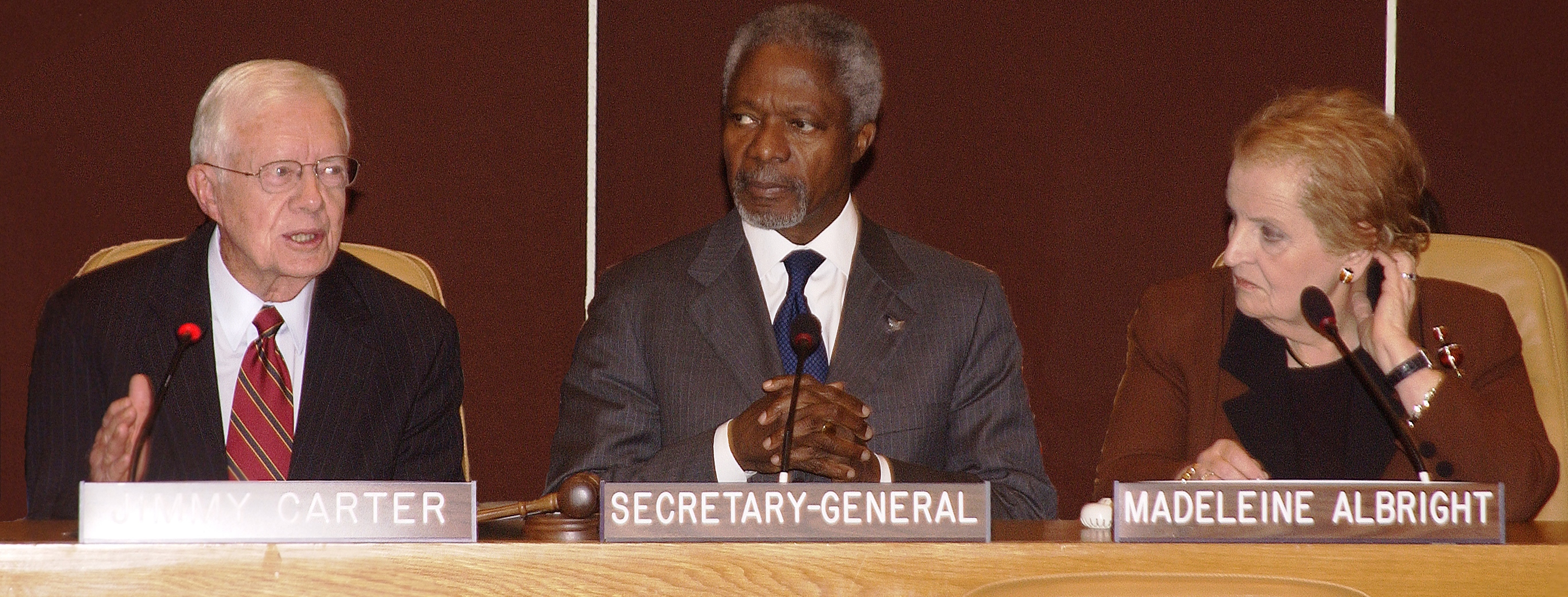A pioneer in the field of election observation, The Carter Center has observed 100 elections in 38 countries and continues to forge methods and tools that lead the field.
Background: Election Observation Standards
The Carter Center worked collaboratively with the National Democratic Institute of International Affairs and the United Nations Electoral Assistance Division from 2003 to 2005 to build consensus on the guiding principles for international observation. This process resulted in the Declaration of Principles for International Election Observation and its accompanying Code of Conduct for election observers, which were endorsed at the United Nations in October 2005 in an event co-chaired by former U.S. President Jimmy Carter, U.N. Secretary-General Kofi Annan, Organization of American States Secretary-General José Miguel Insulza, and National Democratic
Institute Chair Madeleine Albright. While the Declaration of Principles was an important benchmark in the development of international election observation, it focused only on general guidelines for professional observation and did not address the need for consensus on international standards for assessing democratic elections.
Tools for Better Elections
From 2005 to 2014, The Carter Center led efforts to build consensus among international election observation organizations on using public international human rights laws as the basis for assessment criteria. A critical result was the 2010 launch of the online Database of Obligations, a first-of-its-kind publicly accessible tool for use by observers, citizens, election commissions, and others to better understand how international standards for elections directly impact them and the elections they are observing or participating in. In addition, the Center developed a number of reporting tools and templates for use by its election mission teams. The Center began providing tools and capacity-building materials for domestic observation organizations, election management bodies, and other election stakeholders interested in learning more about the human rights underpinnings of election quality. As part of this project, the Center developed an open-source election monitoring software called ELMO and has provided sustained support to domestic observers in the Democratic Republic of the Congo. In 2014, the database was redesigned as the Election Obligations and Standards Database, and a detailed companion handbook, “Election Obligations and Standards: A Carter Center Assessment Manual,” was launched at the United Nations.
Now The Carter Center is embarking on a new phase of programming, the Human Rights and Election Standards project, which will respond to both the need for more and better international law on elections and the need for more follow-up to and implementation of election observation mission recommendations. Through partnerships with the U.N. Office of the High Commissioner for Human Rights and peer organizations such as the International Foundation for Electoral Systems (IFES), the Center will conduct a series of activities that advance the evolution of international standards and increase the use of shared knowledge on election integrity, election observation, and democracy promotion. Activities will include a series of workshops on human rights and election standards, workshops on indicators for electoral integrity, and capacity-building programs for local partner organizations at the country level.
Elections in the United States
Finally, as The Carter Center marks 10 years as an original endorser of the Declaration of Principles for International Election Observation, its Democracy Program has launched a new project aimed at supporting those working to improve the quality of elections in the United States. The Center and partner organizations will raise awareness of the important contributions that objective, data-driven election observation can make to election reform. The Carter Center will partner with the National Conference of State Legislatures to build a clearinghouse of information on U.S. election observation and to provide tools and resources derived from the Center’s extensive international election observation experience. The partners will reach out to state election authorities, state legislators, and others about election observation in the United States in an effort to raise awareness of the important benefits that observation can bring to electoral processes and voter experience. In addition, the Center will develop training resources for citizen observation groups in the United States.

